SanDisk Extreme Pro SSD (240GB, 480GB & 960GB) Review: The Fastest Just Got Faster
by Kristian Vättö on June 16, 2014 4:00 PM EST- Posted in
- Storage
- SSDs
- SanDisk
- Extreme Pro
Random Read/Write Speed
The four corners of SSD performance are as follows: random read, random write, sequential read and sequential write speed. Random accesses are generally small in size, while sequential accesses tend to be larger and thus we have the four Iometer tests we use in all of our reviews.
Our first test writes 4KB in a completely random pattern over an 8GB space of the drive to simulate the sort of random access that you'd see on an OS drive (even this is more stressful than a normal desktop user would see). We perform three concurrent IOs and run the test for 3 minutes. The results reported are in average MB/s over the entire time.
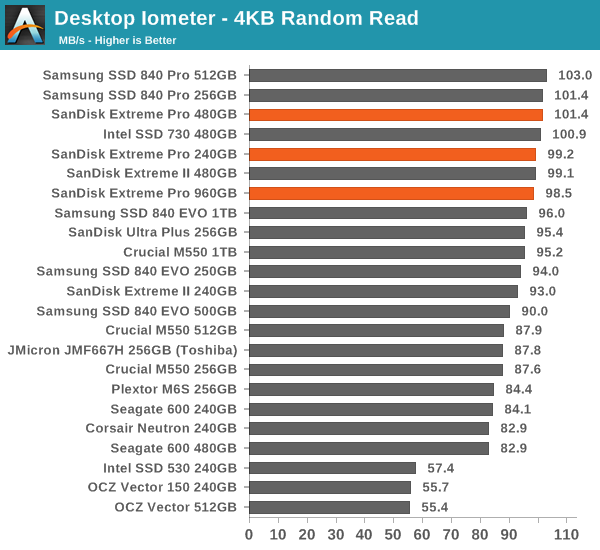
The random read performance is great, which was expected when coming from the Extreme II.
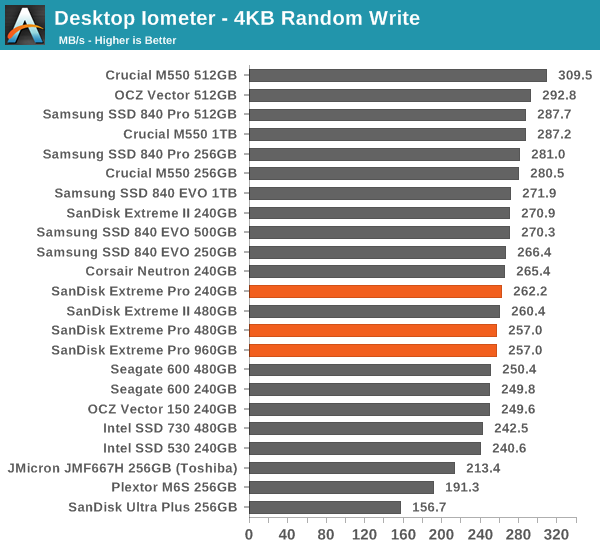
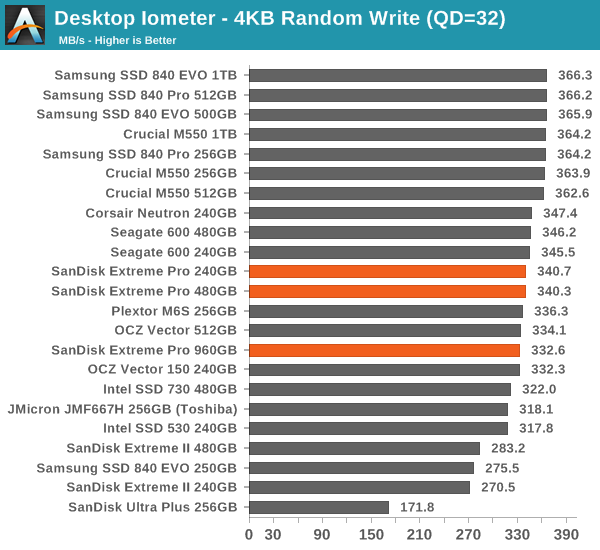
Random write performance, on the other hand, is only mediocre, although it's consistency that matters and not necessarily the peak performance. It seems that drives with high consistency do not have as good peak performance because the Extreme Pro, Vector 150 and SSD 730 are in the middle, whereas the 840 EVO and M550 lead the pack despite their relatively poor IO consistency. I would take consistency over ~10% better peak performance, though.
Sequential Read/Write Speed
To measure sequential performance we run a 1 minute long 128KB sequential test over the entire span of the drive at a queue depth of 1. The results reported are in average MB/s over the entire test length.
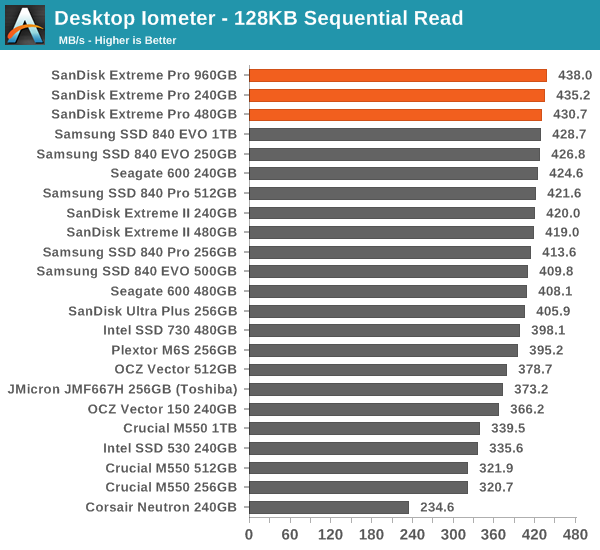
Sequential performance is definitely good. I think the high read speed is one of the reasons why the Extreme Pro did so well in the 2013 Storage Bench because both the SSD 730 and Vector 150 are noticeably slower.
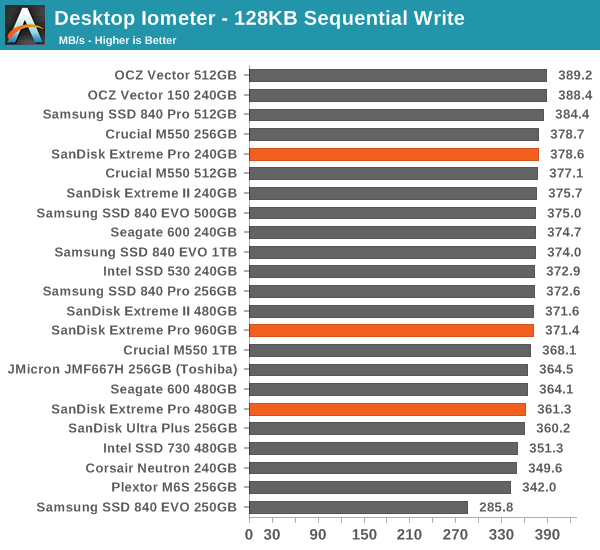
AS-SSD Incompressible Sequential Read/Write Performance
The AS-SSD sequential benchmark uses incompressible data for all of its transfers. The result is a pretty big reduction in sequential write speed on SandForce based controllers.
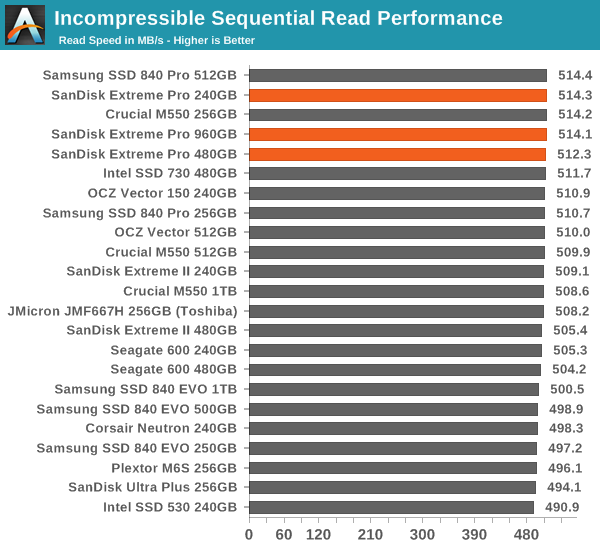
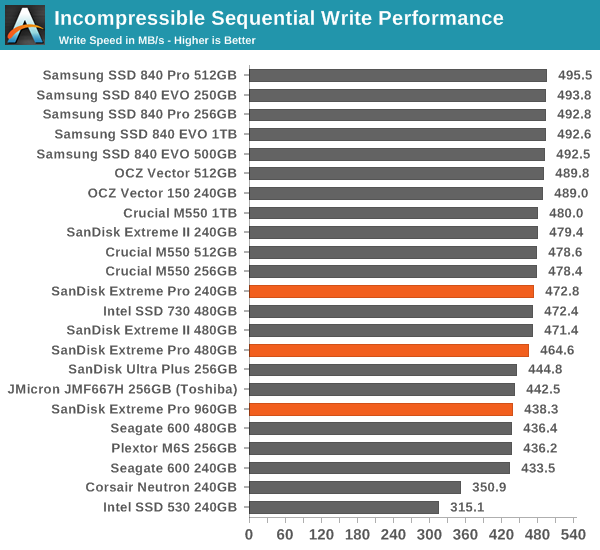










85 Comments
View All Comments
Highlanderix - Thursday, June 26, 2014 - link
Well, I don't understand very well how or why the SanDisk Extreme Pro and SanDisk Extreme II finish in front in AnandTech Storage Bench 2013 when it seemed to me that Samsung 840 Pro outperforms the SanDisk Extreme II by some distance (according to other websites) in terms of 4K write I/O operations. I saw 90K against 30K for the SanDisk in one test and 90K against 60K in another.Is it the mix of both types of operation (read/write) that makes the difference or is the AnandTech Storage Bench 2013 using more intensively non-4K read/write operations where perhaps the SanDisk SSDs perform better ? And would it be possible to have some results for the Samsung 840 Pro 256Gb in AnandTech Storage Bench 2013 please if the SSD is still available for testing ? :) Thanks :)
Highlanderix - Thursday, June 26, 2014 - link
And finally, I hesitate between the SanDisk Extreme Pro 256Gb (150€ here in France) and the Samsung 840 Pro 256Gb (165€). 10 year warranty sound really good but which one is better in terms of pure performance ? Which one should I take ?Phreedom1 - Sunday, June 29, 2014 - link
I don't understand. In this review it says that the Sandisk Extreme Pro is the fastest SSD available yet when you go to the "Bench" area of this website, pick the Extreme Pro and put it up against something like the Samsung 840 Pro, the Samsung wins in many of the benchmarks. Even when put up against the Sandisk Extreme II the newer Extremem Pro loses out in many of the marks. I'm just looking for the all around fastest 240/256GB SSD but it seems every site I go to has a different opinion.himem.sys - Monday, June 30, 2014 - link
Some people complain about real-world difference between ssd drives (because drives are fast enough). Nah, thay arent :). I can tell that my 240GB hyperx is better than most 7k rpm drives, but its a turtle wgen compared to ramdrive. I cutted off 25GB partition from 32Gb of total memory to do some special things and i see huge difference. Installation a windows 2012 r2 with sql 2012 on hyper-v? Its a matter of minutes (i7 3770 @ 4.1). Benchmarks? Who needs them when you have powershell [get-counter -Counter '\process(_total)\io data operations/sec']. I used ramdrives on dell r820 filled with ram and can tell this: the slowest part of pc/server is and will be cpu :).Tornadotuan - Friday, July 8, 2016 - link
Hi Hardware Community,I know this article is quite outdated right now, nevertheless the actual topic of the authors "Final Words" bug me right now. Especially now that enough time for longtime-endurance tests has passed.
Anyway, I can´t choose between the Samsung EVO 850 1TB v2 (289€) and die SanDisk Extreme 960GB (281€).
So pricewise the "Pro" is even cheaper right now compared to the Samsung. But there are some obvious differences:
- TLC 3D V-NAND vs. MLC Planar
- 5 years vs. 10 years warranty
- 150 TBW vs. 80 TBW
- higher Peak vs. consistency
- Samsung Bugging vs. sudden death drives
My usage:
- Client for everything: gaming, programming, office, multimedia - averything
- gonna split it in system and data-partition
- gonne be in laptop that´s used as desktop
- battery is wasted, so no concern about power consumption
So, usually I use hardware until it´s broken so meaning about 8-10 years.
Still I want steady performance without sudden decline in speed like with the EVO 840 :C
I´d be really glad, if you could tell me your opinion on this :)